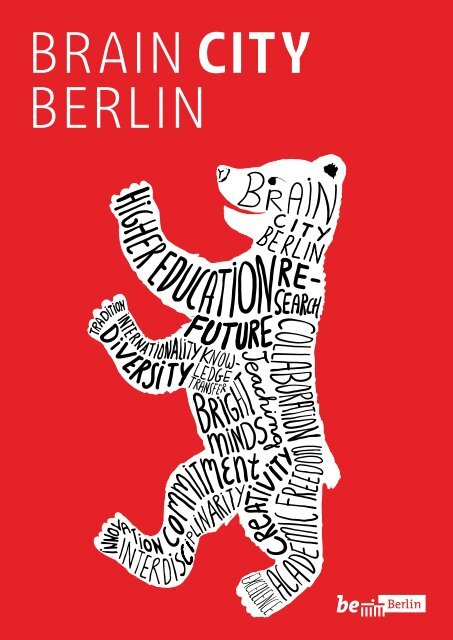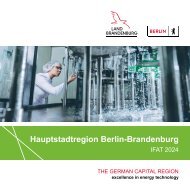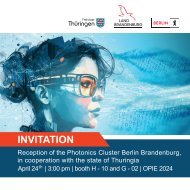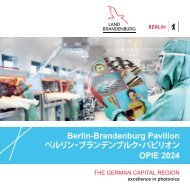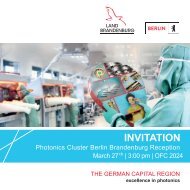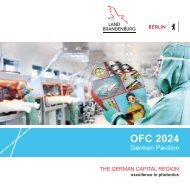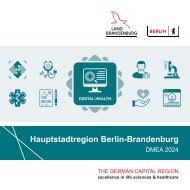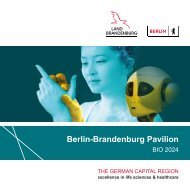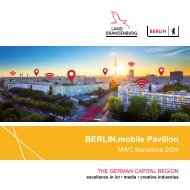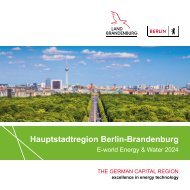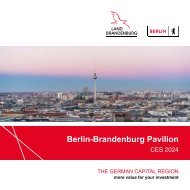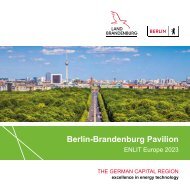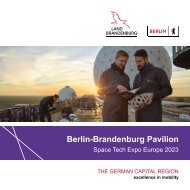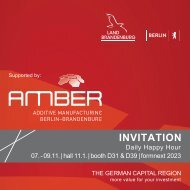BrainCity Berlin
Create successful ePaper yourself
Turn your PDF publications into a flip-book with our unique Google optimized e-Paper software.
BRAIN CITY<br />
BERLIN
Contents<br />
6 4move <strong>Berlin</strong> to academic freedom<br />
Higher education and science A long-standing commitment<br />
8<br />
Brain City: more than the<br />
∑um of its parts<br />
10<br />
Brain City map<br />
(removable)<br />
13<br />
Higher education and research are<br />
international, and so is <strong>Berlin</strong><br />
14 18<br />
Together for excellence<br />
Facts & figures
Welcome to<br />
Brain City!<br />
Brain City <strong>Berlin</strong>: so much more than a clever<br />
advertising slogan. Imagine a city proud of its<br />
great scientific and academic tradition that<br />
is also one of the most exciting centres of<br />
science and learning in the world today. A city<br />
whose most important future resources are<br />
research and innovation. Imagine a city where<br />
scientific and academic excellence does not<br />
exist in an ivory tower, but instead engages in<br />
open dialogue with the city’s people. Imagine a<br />
city where people benefit daily from research,<br />
and where research is not only independent<br />
but where its promotion is a political priority.<br />
Imagine a city that breathes freedom and<br />
openness to the world, that places great<br />
emphasis on cooperation, and where diversity<br />
and equality are values that all live by.<br />
All of these many cities are actually just one:<br />
the Brain City <strong>Berlin</strong>. A quarter of a million<br />
people from every country in the world come<br />
here to study, teach, do research and work in<br />
science. Bright minds who move our society<br />
with ideas and innovations, develop smart<br />
technologies and revolutionise medicine. Outstanding<br />
universities and committed teachers<br />
that make <strong>Berlin</strong> one of the world’s most<br />
popular places to study. Recent graduates,<br />
creative people and entrepreneurs that are<br />
growing our city and making it a centre for<br />
the arts and start-ups. Researchers and students,<br />
too, who have fled their home countries<br />
to find support and academic freedom here.<br />
Our Brain City <strong>Berlin</strong> is a place where borders<br />
are overcome and walls are broken down.<br />
A place where the world comes together<br />
and is explored in depth – from great world<br />
literature to the tiniest of nanospheres.<br />
A place enthusiastic about higher education<br />
and research and that invests in its<br />
institutions now and for the future.<br />
And yes, Brain City <strong>Berlin</strong> is also a smart<br />
advertising slogan. Just as higher education<br />
and research are standard-bearers for our<br />
city’s reputation at home and abroad.<br />
Welcome to <strong>Berlin</strong>, the city of bright minds!<br />
Michael Müller<br />
Governing Mayor of <strong>Berlin</strong> and<br />
Senator for Higher Education<br />
and Research<br />
3
Higher education and<br />
science move <strong>Berlin</strong><br />
Science and academia are the driving force behind <strong>Berlin</strong>’s innovative economy<br />
and ensure people use research and resources responsibly in every respect.<br />
They provide important insights and technologies for a socially and ecologically<br />
sustainable city of the future, and provide answers to the needs of a growing<br />
metropolis where people can enjoy living well and safely.<br />
Autonomous<br />
driving<br />
What has been<br />
discussed and<br />
developed in<br />
lecture halls and<br />
laboratories for<br />
years is now being<br />
tested and even<br />
transporting passengers<br />
at several<br />
locations in <strong>Berlin</strong>:<br />
a test track for<br />
autonomous driving<br />
is being built on<br />
the Straße des 17.<br />
Juni to the west of<br />
the Brandenburg<br />
Gate as part of the<br />
DIGINET-PS project.<br />
Self-propelled<br />
electric buses are<br />
being tested on the<br />
EUREF campus in<br />
Schöneberg and,<br />
on the Charité<br />
Campus in Mitte<br />
and Wedding, they<br />
have been shuttling<br />
passengers<br />
since early 2018.<br />
Creative ideas and professionals for the<br />
city of tomorrow<br />
<strong>Berlin</strong> has set itself the goal of becoming<br />
a leading smart city. Innovations and technological<br />
progress contribute to improving<br />
the quality of life in the city and will help to<br />
make <strong>Berlin</strong> climate-neutral by 2050. The<br />
interaction between research, established<br />
companies and start-ups is key here. Many<br />
collaborative projects are working on intelligent<br />
solutions for the city of tomorrow.<br />
The planned CityLAB <strong>Berlin</strong> will make new<br />
technologies and services more understandable<br />
and tangible.<br />
<strong>Berlin</strong>ers of all ages and walks of life are<br />
benefiting from science and academia in all<br />
aspects of their lives. <strong>Berlin</strong>’s universities<br />
are training the next generation of teachers<br />
for the state’s schools, the Alice Salomon<br />
Hochschule <strong>Berlin</strong> is working to meet the<br />
additional demand for nursing staff, and the<br />
<strong>Berlin</strong> School of Economics and Law is providing<br />
management trainees for business,<br />
government and the police. Just three small<br />
facts that show how academics and research<br />
are important to the fabric of the city.<br />
No ivory towers<br />
The city’s academic institutions keep in touch<br />
with the public with open lectures, auditing<br />
opportunities and science slams. Digitalisation<br />
projects are giving the public the opportunity<br />
to look at long-hidden worlds, archives and<br />
collections. Many even invite people to join<br />
in, such as the Herbonauts project at <strong>Berlin</strong>’s<br />
Botanical Gardens, where anyone can help<br />
complete a database of almost four million<br />
plant species to support biodiversity research.<br />
A special experience each year is the annual<br />
Long Night of the Sciences, a city-wide open<br />
house where scientific institutions fling wide<br />
their doors and provide an outstanding programme<br />
of events for all ages. This “smartest<br />
night of the year” has long since become<br />
a fixture for summers in <strong>Berlin</strong>, with 35,000<br />
visitors checking out more than 2,000 events<br />
across the city. The <strong>Berlin</strong> Science Week at<br />
the beginning of November each year is<br />
another great opportunity for the public to<br />
check out the latest scientific developments.<br />
Whether quantum technology, new populism<br />
or artificial intelligence, this event brings<br />
<strong>Berlin</strong>’s world of research together to discuss<br />
a kaleidoscope of current topics and exciting<br />
insights into the research of tomorrow.<br />
4
Driving culture<br />
Science and culture form a special symbiosis<br />
in <strong>Berlin</strong>. Many museums are also research<br />
institutions that work closely with other<br />
scientific institutions and benefit from their<br />
mutual expertise. With four universities for<br />
the arts, including the internationally renowned<br />
Universität der Künste <strong>Berlin</strong>, the city<br />
offers plenty of opportunities for young talent<br />
in the city’s theatres, opera houses and concert<br />
halls. They come from all over the world<br />
to attend university here, and their graduates<br />
are much sought-after around the world.<br />
For example, the alumni of the Hanns Eisler<br />
School of Music, who conduct orchestras in<br />
Tel Aviv or run concert halls in Oslo. But you<br />
don’t have to travel far to see the art created<br />
and performed by <strong>Berlin</strong>’s universities. For<br />
example, at the Ernst Busch Academy of Dramatic<br />
Arts, you can regularly see tomorrow’s<br />
stars perform at the BAT Theater. Students<br />
and graduates of the <strong>Berlin</strong> Weissensee<br />
School of Art design not only stage sets and<br />
costumes, but also hip magazines, public<br />
spaces and commercial products. Hundreds<br />
of events are held annually with <strong>Berlin</strong>’s<br />
cultural institutions.<br />
Driving the economy<br />
Academics and research are some of the<br />
largest employers in the city. The city’s state<br />
universities employ about 48,000 people, and<br />
many more are employed at its research institutes<br />
and private universities. Teaching and<br />
research are driving <strong>Berlin</strong>’s economic growth.<br />
Particularly innovative sectors benefit from<br />
basic research and the opportunities for cooperation<br />
in applied research. Together with the<br />
outstanding education received by thousands<br />
of recent graduates, these are a key argument<br />
for many companies choosing to locate in<br />
<strong>Berlin</strong>. <strong>Berlin</strong>’s universities alone have spun<br />
off over 1,000 companies with 22,000 new<br />
jobs and billions in sales.<br />
The <strong>Berlin</strong> Museum of Natural History, one of the eight Leibniz research museums,<br />
holds about one million animal specimens for scientific research in its wet collection.<br />
The city’s universities of applied sciences play<br />
a special role in promoting <strong>Berlin</strong> as a location<br />
for business.<br />
To strengthen regional innovation and<br />
competitiveness, <strong>Berlin</strong> has set up centres for<br />
the future where academics, research and<br />
industry can collaborate. One such location<br />
is Adlershof, home to non-university and<br />
academic research institutions as well as<br />
hundreds of companies, including 40 world<br />
market leaders. The research being done at<br />
Adlershof continues to write the future. The<br />
Ferdinand-Braun-Institut für Höchstfrequenztechnik<br />
(FBH) is pushing new initiatives to turn<br />
<strong>Berlin</strong> into a top location for microelectronics,<br />
while the Helmholtz-Zentrum <strong>Berlin</strong> (HZB)<br />
is making plans for some quantum leaps in<br />
energy research. These are just two examples<br />
that illustrate the great dynamics of the ten<br />
centres for the future in <strong>Berlin</strong>.<br />
<strong>Berlin</strong> Science Prize<br />
In 2017, the <strong>Berlin</strong> Science Prize was<br />
awarded for the tenth time by the<br />
city’s Governing Mayor to recognise<br />
outstanding achievements in science<br />
and research made in <strong>Berlin</strong>. An<br />
outstanding achievement by a young<br />
scientist is also honoured each year.<br />
5
A long-standing<br />
commitment to<br />
academic freedom<br />
Science and academia in <strong>Berlin</strong> can look back on centuries of tradition, with<br />
many great moments as well as some of the darkest abysses of German history.<br />
This obligates us to preserve their freedom.<br />
Two <strong>Berlin</strong> brothers<br />
Two world-famous <strong>Berlin</strong> brothers are symbols of what<br />
science and academia in <strong>Berlin</strong> have stood for both in<br />
the past and present: a commitment to society, scientific<br />
excellence and international cooperation.<br />
Alexander von Humboldt,<br />
the respected naturalist<br />
and passionate humanist, is<br />
world-famous for his scientific<br />
expeditions and research work<br />
in botany. As a pioneer in<br />
creating international scientific<br />
networks, he is the namesake<br />
of the Alexander von Humboldt<br />
Foundation, which today<br />
enables top researchers from<br />
all over the world to spend<br />
time working in Germany.<br />
Alexander von Humboldt<br />
would be especially pleased<br />
that so many of those receiving<br />
the grants named after<br />
him choose to come to <strong>Berlin</strong>.<br />
In fact, the city ranks first in<br />
destinations chosen.<br />
His brother Wilhelm von<br />
Humboldt worked in a wide<br />
range of fields, including<br />
the theory of the state,<br />
literature and art, and founded<br />
the field of comparative linguistics.<br />
He became especially<br />
known as an educational<br />
reformer. He pushed for<br />
scientific independence, the<br />
integration of the humanities<br />
and natural sciences, and, not<br />
least, the unity of teaching<br />
and research. Humboldt’s<br />
educational ideals became the<br />
blueprint for modern universities<br />
worldwide. Today, the<br />
university founded by Wilhelm<br />
von Humboldt in <strong>Berlin</strong> in 1809<br />
also bears the names of the<br />
two brothers: the Humboldt-<br />
Universität zu <strong>Berlin</strong>.<br />
A statue of Wilhelm von Humboldt in front of the<br />
main building of the university named after him and<br />
his brother on Unter den Linden in <strong>Berlin</strong>.<br />
6
Elsa Neumann was<br />
the first woman to<br />
obtain a doctorate<br />
in physics in 1899.<br />
Today, the federal<br />
state of <strong>Berlin</strong><br />
awards doctoral<br />
scholarships in<br />
her honour.<br />
Numerous great names in the history of science<br />
are closely associated with <strong>Berlin</strong>, further<br />
highlighting the city’s long scientific tradition.<br />
The city was home to medical doctors like<br />
Rudolf Virchow and Robert Koch, after whom<br />
one of the Charité’s campuses and the federal<br />
government’s world-famous Robert Koch<br />
Institute are named, respectively. The father<br />
of the modern computer, Konrad Zuse,<br />
studied here and developed his computer in<br />
Kreuzberg. The Zuse Institute for Information<br />
Technology is named after him.<br />
Hans Geiger developed the Geiger counter<br />
here together with his doctoral student. Lise<br />
Meitner and Otto Hahn discovered, explained<br />
and proved nuclear fission in <strong>Berlin</strong>. In 1700,<br />
polymath Gottfried Wilhelm Leibniz founded<br />
what is today the <strong>Berlin</strong>-Brandenburg Academy<br />
of Sciences with offices on the Gendarmenmarkt.<br />
The Leibniz Association is also<br />
based in <strong>Berlin</strong>. Another polymath, Hermann<br />
von Helmholtz, linguists and folklorists Jacob<br />
and Wilhelm Grimm, inventor and industrialist<br />
Werner von Siemens, aviation pioneer Otto<br />
Lilienthal, and the inventor of the electron<br />
microscope, Ernst Ruska, as well as countless<br />
other scientists worked in <strong>Berlin</strong>. One of the<br />
most significant personalities in the history of<br />
science, Albert Einstein, completed his theory<br />
of relativity in <strong>Berlin</strong> and received the Nobel<br />
Prize in Physics. With the rise of National<br />
Socialism in Germany, Einstein was forced<br />
to emigrate to the USA where he lived in<br />
Princeton, New Jersey. Today, the Einstein<br />
Foundation funds top-level research in <strong>Berlin</strong>.<br />
When Adolf Hitler was named chancellor<br />
in 1933, it meant an end to academic and<br />
research freedom in Germany. Numerous<br />
scientists were forced to flee <strong>Berlin</strong>. Many<br />
others were killed. Others accommodated the<br />
criminal Nazi regime or even put themselves<br />
at its service with zeal. After the war, many<br />
of those who had been forced to emigrate<br />
returned to rebuild teaching and research<br />
in the western part of the city. In East <strong>Berlin</strong>,<br />
critical science and academia was only<br />
possible under difficult conditions, as it was<br />
subject to strict ideological control.<br />
This history has made the obligation to<br />
protect the freedom of teaching and research<br />
an obligation for all, especially for those of<br />
us in <strong>Berlin</strong>. In times of increasing hostility to<br />
science, <strong>Berlin</strong> stands by this responsibility<br />
and welcomes scientists and scholars from<br />
around the world who are under threat in<br />
their home countries.<br />
Promoting scientific freedom<br />
In early 2018, the <strong>Berlin</strong> Senate established<br />
a new programme for the promotion<br />
of scientific and academic freedom at<br />
the Einstein Foundation to help researchers<br />
under threat in their home countries.<br />
Einstein Visiting Professorships and<br />
Einstein Junior Scholarships will allow<br />
them to pursue their work freely in <strong>Berlin</strong>.<br />
In addition, universities and research<br />
institutions in <strong>Berlin</strong> are actively involved<br />
in networks such as Scholars at Risk and<br />
the Philipp Schwartz Initiative of the<br />
Alexander von Humboldt Foundation in<br />
order to offer persecuted scientists a new<br />
academic home in <strong>Berlin</strong>.<br />
7
Brain City:<br />
more than the ∑um<br />
of its parts<br />
Brain City <strong>Berlin</strong> has a uniquely dense and<br />
diverse range of academic and research<br />
institutions: in addition to the 11 state and<br />
about 30 private universities, the Charité, and<br />
more than 70 non-academic research institutions,<br />
there are numerous federal institutions,<br />
private-sector research institutes and campuses<br />
of international universities in the city.<br />
total of €8.1 billion in financing to the city’s<br />
universities. In addition, the state has other<br />
instruments to promote certain areas. These<br />
include programmes for teaching, equal opportunities,<br />
as well as research funding with<br />
the Einstein Foundation <strong>Berlin</strong>. The Institute<br />
for Applied Research (IFAF) promotes cooperation<br />
between the state universities of applied<br />
sciences and regional business.<br />
The non-academic research institutions of<br />
the Max Planck Society, the Leibniz Society<br />
and the Helmholtz Association receive both<br />
federal and state funding. In addition, <strong>Berlin</strong><br />
has research institutes that are the sole<br />
responsibility of the state, such as the Zuse<br />
Institute <strong>Berlin</strong>.<br />
On 16 January 2018, the state’s contracts with the<br />
11 universities for 2018–2022 were formally signed and<br />
came into force. Governing Mayor Michael Müller and<br />
Professor Sabine Kunst, President of Humboldt University.<br />
Academics and research are integral to the<br />
city. And they shape its landscape: the state<br />
universities and the Charité alone cover an<br />
area equal to 256 football fields.<br />
There are no tuition fees at state universities;<br />
the basic funding is provided by the state of<br />
<strong>Berlin</strong>, as agreed every five years in contracts<br />
concluded with the universities. This funding<br />
is based on key performance indicators such<br />
as teaching, research and equality/diversity<br />
and is paid out annually. The state and the<br />
universities work together to set targets,<br />
and reports document the universities’<br />
performance. In the current five-year period<br />
(2018–2022), the state will be providing a<br />
The Studierendenwerk <strong>Berlin</strong> also receives state<br />
subsidies. On behalf of the state, it operates<br />
57 cafeterias at universities throughout<br />
<strong>Berlin</strong>, serving an average of 40,000 meals a<br />
day during the semester. It also operates halls<br />
of residence that provide housing for about<br />
9,300 students. While their parents are studying<br />
or working at universities, the youngest<br />
are well looked after in the day-care centres<br />
operated by the Studierendenwerk. It also<br />
offers a variety of advisory and counselling<br />
services for students and organises cross-university<br />
cultural events.<br />
Further information on the<br />
2018–2022 university contracts.<br />
8
“<strong>Berlin</strong> is free. The future<br />
is being built in <strong>Berlin</strong>.<br />
So much creativity is<br />
happening in <strong>Berlin</strong>.<br />
It’s in the air we breathe<br />
in <strong>Berlin</strong>.”<br />
PROFESSOR EUN-HWA CHO<br />
COMPOSITION, HANNS EISLER<br />
SCHOOL OF MUSIC, BERLIN<br />
PROFESSOR BIRGIT FELDEN<br />
SMES, SUCCESSION ISSUES,<br />
AND BUSINESS, UNIVERSITY<br />
OF ECONOMICS AND LAW<br />
BERLIN<br />
DIPL.-ING. CEM AVSAR<br />
AEROSPACE INSTITUTE,<br />
TECHNICAL UNIVERSITY<br />
OF BERLIN<br />
“<strong>Berlin</strong> is home to<br />
innovations that reach<br />
into space.”<br />
“<strong>Berlin</strong> is entrepreneurial<br />
and diverse. Established<br />
companies large and small<br />
work side-by-side with<br />
start-ups for everyone’s<br />
benefit. Founders, academics,<br />
scientists and the next<br />
generation putting innovative<br />
ideas into practice.”<br />
“<strong>Berlin</strong> offers space for<br />
ideas and exchange.<br />
This makes the city<br />
interesting for the<br />
artistic scene.”<br />
PROFESSOR NIK HAFFNER<br />
INTER-UNIVERSITY<br />
CENTER FOR DANCE (HZT),<br />
UNIVERSITÄT DER KÜNSTE<br />
BERLIN<br />
9
BRAIN<br />
CITY<br />
MAP
Universities<br />
1 Freie Universität <strong>Berlin</strong><br />
fu-berlin.de<br />
2 Humboldt-Universität zu <strong>Berlin</strong><br />
hu-berlin.de<br />
3 Technische Universität <strong>Berlin</strong><br />
tu-berlin.de<br />
4 Universität der Künste <strong>Berlin</strong><br />
udk-berlin.de<br />
University hospitals<br />
5 Charité – Mitte Campus<br />
Benjamin Franklin Campus<br />
Virchow Clinic Campus<br />
Buch Campus<br />
charite.de<br />
Arts academies<br />
6 Hanns Eisler School of Music<br />
hfm-berlin.de<br />
7 University of Performing Arts<br />
Ernst Busch<br />
hfs-berlin.de<br />
8 Weißensee Academy of Art <strong>Berlin</strong><br />
kh-berlin.de<br />
Universities of applied sciences<br />
9 Beuth University of Applied<br />
Sciences <strong>Berlin</strong><br />
beuth-hochschule.de<br />
10 HTW <strong>Berlin</strong> – University<br />
of Applied Sciences<br />
htw-berlin.de<br />
11 Hochschule für Wirtschaft<br />
und Recht <strong>Berlin</strong> (HWR <strong>Berlin</strong>)<br />
hwr-berlin.de<br />
12 Alice-Salomon-Hochschule<br />
für Sozialarbeit und Sozialpädagogik<br />
<strong>Berlin</strong> (ASH)<br />
ash-berlin.eu<br />
Religious universities<br />
13 Evangelische Hochschule <strong>Berlin</strong> (EHB)<br />
eh-berlin.de<br />
14 Catholic University of Applied<br />
Social Sciences <strong>Berlin</strong> (KHSB)<br />
khsb-berlin.de<br />
Private universities<br />
15 Akkon University for Human Sciences<br />
akkon-hochschule.de<br />
16 Bard College <strong>Berlin</strong> – a Liberal<br />
Arts University in <strong>Berlin</strong><br />
berlin.bard.edu<br />
17 Barenboim-Said Akademie gGmbH<br />
barenboim-said.com<br />
18 BAU International <strong>Berlin</strong> –<br />
University of Applied Sciences<br />
bauinternational-berlin.de<br />
19 bbw University<br />
bbw-hochschule.de<br />
20 <strong>Berlin</strong> University of Art & Design (btk)<br />
btk-fh.de<br />
21 BSP Business School <strong>Berlin</strong> –<br />
University for Management<br />
businessschool-berlin.de<br />
22 CODE University of Applied Sciences<br />
code.berlin<br />
23 DEKRA | Hochschule für Medien<br />
dekra-hochschule.de<br />
24 design akademie berlin – SRH<br />
Hochschule für Kommunikation<br />
und Design GmbH<br />
design-akademie-berlin.de<br />
25 ESCP Europe – European School<br />
of Management <strong>Berlin</strong><br />
escpeurope.eu<br />
26 European School of Management<br />
and Technology (ESMT)<br />
esmt.org<br />
27 German open Business School (GoBS)<br />
go-bs.de<br />
28 Hertie School of Governance (HSG)<br />
hertie-school.org<br />
29 Hochschule für angewandte<br />
Pädagogik (HSAP)<br />
hsap.de<br />
30 H:G Hochschule für Gesundheit<br />
& Sport, Technik & Kunst<br />
my-campus-berlin.com<br />
31 HMKW University of Applied<br />
Sciences for Media, Communication<br />
and Management<br />
hmkw.de<br />
32 University of Applied Sciences (hwtk)<br />
hwtk.de<br />
33 IB-Hochschule <strong>Berlin</strong><br />
ib-hochschule.de<br />
34 International Psychoanalytic<br />
University <strong>Berlin</strong> (IPU)<br />
ipu-berlin.de<br />
35 Mediadesign – Hochschule für<br />
Kommunikation und Informatik<br />
mediadesign.de<br />
36 Medical School <strong>Berlin</strong><br />
medicalschool-berlin.de<br />
37 Psychologische Hochschule<br />
<strong>Berlin</strong> (PHB)<br />
psychologische-hochschule.de<br />
38 Quadriga University of<br />
Applied Sciences <strong>Berlin</strong><br />
quadriga.eu<br />
39 SRH Hochschule <strong>Berlin</strong><br />
srh-hochschule-berlin.de<br />
40 SRH University of Popular Arts<br />
hdpk.de<br />
41 Steinbeis University <strong>Berlin</strong><br />
steinbeis.de<br />
42 Touro College <strong>Berlin</strong><br />
touroberlin.de<br />
Non-academic research institutions<br />
Leibniz Association<br />
43 German Institute for International<br />
Educational Research (DIPF),<br />
<strong>Berlin</strong> campus: Library for Research<br />
in the History of Education (BBF)<br />
bbf.dipf.de<br />
44 German Institute for Economic<br />
Research (DIW <strong>Berlin</strong>) and<br />
Socio-Economic Panel (SOEP)<br />
diw.de<br />
45 German Rheumatism Research<br />
Center <strong>Berlin</strong> (DRFZ)<br />
drfz.de<br />
46 Institut für Analytische<br />
Wissenschaften e.V. (ISAS)<br />
isas.de<br />
47 Museum of Natural History (MfN)<br />
naturkundemuseum.berlin<br />
48 WZB <strong>Berlin</strong> Social Science Center<br />
wzb.eu<br />
49 Leibniz-Zentrum Allgemeine<br />
Sprachwissenschaft (ZAS)<br />
zas.gwz-berlin.de<br />
50 Leibniz-Zentrum Moderner Orient<br />
(ZMO)<br />
zmo.de<br />
51 Zentrum für Literatur- und<br />
Kulturforschung (ZfL)<br />
zfl-berlin.org<br />
Leibniz Association/<br />
Research Association <strong>Berlin</strong><br />
52 Forschungsverbund <strong>Berlin</strong> e. V.<br />
fv-berlin.de<br />
53 Ferdinand-Braun-Institut,<br />
Leibniz-Institut fuer Höchstfrequenztechnik<br />
(FBH)<br />
hu-berlin.de<br />
54 Leibniz-Forschungsinstitut für<br />
Molekulare Pharmakologie (FMP)<br />
leibniz-fmp.de<br />
55 Leibniz Institute for Freshwater<br />
Ecology and Inland Fisheries (IGB)<br />
igb-berlin.de<br />
56 Leibniz Institute for<br />
Crystal Growth (IKZ)<br />
ikz-berlin.de<br />
57 Max Born Institute for<br />
Nonlinear Optics and Short<br />
Pulse Spectroscopy (MBI)<br />
mbi-berlin.de<br />
58 Paul-Drude-Institut für<br />
Festkörperelektronik <strong>Berlin</strong> (PDI)<br />
pdi-berlin.de<br />
59 Weierstraß-Institut für Angewandte<br />
Analysis und Stochastik (WIAS)<br />
wias-berlin.de<br />
60 Leibniz Institute for Zoo and Wildlife<br />
Reasearch (IZW)<br />
izw-berlin.de<br />
Helmholtz Association of<br />
German Research Centers<br />
61 Helmholtz Zentrum <strong>Berlin</strong> für<br />
Materialien und Energie (HZB)<br />
helmholtz-berlin.de<br />
62 Max Delbrück Center for<br />
Molecular Medicine in the<br />
Helmholtz Association (MDC)<br />
mdc-berlin.de<br />
63 German Center for Neurodegenerative<br />
Diseases (DZNE), <strong>Berlin</strong><br />
dzne.de/standorte/berlin<br />
64 German Cancer Consortium<br />
(DKTK) – <strong>Berlin</strong> location<br />
dktk.dkfz.de/de/standorte/berlin<br />
65 German Aerospace Center (DLR),<br />
<strong>Berlin</strong>-Adlershof<br />
dlr.de/<strong>Berlin</strong><br />
Fraunhofer Association<br />
66 Fraunhofer Institute for Open<br />
Communication Systems (FOKUS)<br />
fokus.fraunhofer.de<br />
67 Fraunhofer Institute for<br />
Telecommunications,<br />
Heinrich Hertz Institute (HHI)<br />
hhi.fraunhofer.de<br />
68 Fraunhofer Institute for Production<br />
Systems and Design Technology (IPK)<br />
ipk.fraunhofer.de<br />
69 Fraunhofer Institute for Reliability<br />
and Microintegration (IZM)<br />
izm.fraunhofer.de<br />
70 Fraunhofer IUK Technology Group<br />
iuk.fraunhofer.de<br />
71 Fraunhofer Microelectronics Group<br />
mikroelektronik.fraunhofer.de<br />
72 Fraunhofer Forum <strong>Berlin</strong><br />
forum.fraunhofer.de<br />
Max Planck Society<br />
73 Fritz Haber Institute (FHI)<br />
fhi-berlin.mpg.de<br />
74 Max Planck Institute for<br />
Human Development (MPIB)<br />
mpib-berlin.mpg.de<br />
75 Max Planck Institute for<br />
Infection Biology (MPIIB)<br />
mpiib-berlin.mpg.de<br />
76 Max Planck Institute for<br />
Molecular Genetics (MPIMG)<br />
molgen.mpg.de<br />
77 Max Planck Institute for the<br />
History of Science (MPIWG)<br />
mpiwg-berlin.mpg.de<br />
Others<br />
78 <strong>Berlin</strong> Institute of Health (BIH)<br />
bihealth.org<br />
79 The Weizenbaum Institute<br />
for Networked Society<br />
(German Internet Institute)<br />
vernetzung-und-gesellschaft.de<br />
80 <strong>Berlin</strong>-Brandenburg Academy of<br />
Sciences and Humanities (BBAW)<br />
bbaw.de<br />
81 German Centre for Cardiovascular<br />
Research (DZHK)<br />
dzhk.de/standorte/berlin/<br />
82 Historische Kommission<br />
zu <strong>Berlin</strong> (HiKo)<br />
hiko-berlin.de<br />
83 Institut für angewandte<br />
Forschung <strong>Berlin</strong> e. V. (IFAF)<br />
ifaf-berlin.de<br />
84 Japanese-German Center <strong>Berlin</strong> (JDZB)<br />
jdzb.de<br />
85 Wissenschaftskolleg zu <strong>Berlin</strong> (WiKo)<br />
wiko-berlin.de<br />
86 Konrad Zuse Center for Information<br />
Technology <strong>Berlin</strong> (ZIB)<br />
zib.de<br />
Federal institutions<br />
87 Federal Institute for Materials<br />
Research and Testing (BAM)<br />
bam.de<br />
88 Federal Institute<br />
for Risk Assessment (BfR)<br />
bfr.bund.de<br />
89 German Archaeological Institute (DAI)<br />
dainst.org<br />
90 German Centre for Gerontology (DZA)<br />
dza.de<br />
91 Federal Metrology Institute (PTB)<br />
ptb.de<br />
92 Robert Koch Institute (RKI)<br />
rki.de<br />
93 Hochschule des Bundes<br />
für öffentliche Verwaltung<br />
hs-sozialversicherung.de<br />
BRAIN<br />
CITY<br />
BERLIN<br />
42<br />
85<br />
72 73<br />
75 76<br />
84<br />
76<br />
77<br />
50<br />
13<br />
61<br />
25<br />
88<br />
1<br />
73 74<br />
89 89<br />
86<br />
87<br />
92<br />
5<br />
66<br />
68<br />
40 39 4<br />
4 67<br />
35<br />
20 19 3<br />
27<br />
79<br />
11<br />
5<br />
36<br />
21<br />
16<br />
81<br />
9<br />
33<br />
69<br />
77 78<br />
48 47 31<br />
46<br />
63 64 75<br />
45<br />
34<br />
38<br />
13 29 80<br />
93 28 26<br />
5 7019<br />
79<br />
71<br />
6<br />
45<br />
2<br />
44 72<br />
49 48<br />
59<br />
33<br />
18 17 58<br />
32<br />
20 21 59<br />
49 18<br />
82<br />
37<br />
83 51 24<br />
90<br />
40<br />
15<br />
8<br />
4443<br />
22<br />
23<br />
41<br />
30<br />
54<br />
62<br />
5<br />
7<br />
15<br />
10<br />
14<br />
29<br />
56<br />
60 57<br />
46<br />
65<br />
52<br />
53<br />
91<br />
60<br />
12<br />
View the interactive<br />
Brain City Map<br />
online<br />
55<br />
N<br />
11<br />
80<br />
<strong>Berlin</strong> School of<br />
Economics and Law<br />
Innovation and training for the<br />
next generation of professionals<br />
for the growing centre for<br />
start-ups: four state universities<br />
of applied sciences provide<br />
momentum in <strong>Berlin</strong>. One of<br />
these, HWR <strong>Berlin</strong>, is the largest<br />
provider of joint apprenticeship-college<br />
degree (“dual study”)<br />
programmes in Germany.<br />
<strong>Berlin</strong>-Brandenburg<br />
Academy of Sciences and<br />
Humanities (BBAW)<br />
<strong>Berlin</strong> is the largest research<br />
location in Germany and<br />
home to over 70 non-academic<br />
research institutions,<br />
including numerous Leibniz,<br />
Max Planck, Helmholtz and<br />
Fraunhofer Institutes. For<br />
300 years, the <strong>Berlin</strong>-Brandenburg<br />
Academy of Sciences<br />
and Humanities has been<br />
committed to promoting<br />
research excellence.<br />
4<br />
5<br />
Charité – Universitätsmedizin <strong>Berlin</strong><br />
The historic <strong>Berlin</strong> Charité is one of the<br />
largest university hospitals in Europe<br />
and a big part of why <strong>Berlin</strong> is a renowned<br />
centre for medicine.<br />
Universität der Künste <strong>Berlin</strong><br />
The four <strong>Berlin</strong> state art academies enjoy a<br />
great reputation and attract young talents<br />
from all over the world. Universität der<br />
Künste <strong>Berlin</strong> is the largest in Europe.<br />
3<br />
Technische<br />
Universität <strong>Berlin</strong><br />
At the top, both nationally<br />
and internationally: together<br />
with Freie Universität <strong>Berlin</strong><br />
and Humboldt-Universität<br />
zu <strong>Berlin</strong>, the renowned<br />
Technische Universität <strong>Berlin</strong><br />
ranks among the 100 best<br />
universities in the world<br />
and among the top ten in<br />
Germany.
“I congratulate the city<br />
of <strong>Berlin</strong>, which is home<br />
to so much scientific talent<br />
in so many outstanding<br />
institutions. The great<br />
support for research there<br />
is paying off: almost<br />
100 ERC grants valued at<br />
€180 million have to date<br />
been awarded to support<br />
the ambitious ideas<br />
of researchers in <strong>Berlin</strong>.”<br />
PROF. REGINE BUCHHEIM<br />
BUSINESS ADMINISTRATION, HTW BERLIN<br />
UNIVERSITY OF APPLIED SCIENCES<br />
“<strong>Berlin</strong>’s past and present<br />
inspire interdisciplinarity.”<br />
PROF. JESSE PRINZ<br />
PHILOSOPHY AND NEUROSCIENCE,<br />
EINSTEIN VISITING FELLOW,<br />
BERLIN SCHOOL OF MIND AND BRAIN,<br />
HUMBOLDT UNIVERSITY BERLIN<br />
PROFESSOR JEAN-PIERRE BOURGUIGNON<br />
PRESIDENT OF THE EUROPEAN<br />
RESEARCH COUNCIL (ERC)<br />
“<strong>Berlin</strong> is not only home to<br />
practically every academic<br />
discipline at the highest<br />
level, it is also where these<br />
scientific projects come<br />
together, making the city<br />
one of the most exciting<br />
research locations for me.”<br />
DR. TATIANA KOROTKOVA<br />
BEHAVIOURAL NEURODYNAMICS,<br />
LEIBNIZ RESEARCH INSTITUTE<br />
FOR MOLECULAR PHARMACOLOGY (FMP),<br />
BERLIN-BUCH CAMPUS<br />
“Thanks to the many<br />
cooperating research<br />
groups, <strong>Berlin</strong> is one<br />
of the best locations<br />
for neuroscientists. I love<br />
the openness here.”<br />
12
Higher education and<br />
research are international,<br />
and so is <strong>Berlin</strong><br />
<strong>Berlin</strong> is one of the world’s most popular cities<br />
to attend university. One-fifth of the people<br />
studying here come from abroad, and the<br />
number is rising. The city and its academic<br />
landscape are also attracting an increasing<br />
number of recent graduates and established<br />
professors from all over the world. This benefits<br />
research and teaching and the city as a<br />
whole. Internationality is an integral part of<br />
the capital’s self-image.<br />
<strong>Berlin</strong>’s academic and scientific institutions<br />
are among the pioneers in internationalisation<br />
and enjoy extensive global networks of<br />
partnerships. <strong>Berlin</strong> researchers collaborate<br />
with institutions all over the world. Every<br />
semester, thousands of <strong>Berlin</strong> students have<br />
the opportunity to study abroad and thousands<br />
of others come to <strong>Berlin</strong>. The internationality<br />
is also reflected in the range of courses on<br />
offer, whether in joint courses with foreign<br />
partner universities, in the growing number of<br />
master’s degrees taught in foreign languages<br />
(mostly English), and through international<br />
teaching projects and visiting professorships.<br />
Through strategic partnerships with renowned<br />
universities all over the world from Beijing to<br />
Princeton, from Oxford to Jerusalem, <strong>Berlin</strong>’s<br />
universities are firmly anchored in the international<br />
network of leading research locations.<br />
Local presences, such as the Technische<br />
Universität <strong>Berlin</strong> campus in Al Gouna, Egypt,<br />
and the Freie Universität liaison offices on five<br />
continents, also promote the international<br />
networking of Brain City <strong>Berlin</strong>. <strong>Berlin</strong>’s universities<br />
and research institutions are involved<br />
worldwide in development projects and in<br />
setting up new structures to support teaching<br />
and research.<br />
Strong partner in European research<br />
<strong>Berlin</strong> is an active player in European research.<br />
It thus strengthens the European idea and<br />
helps Europe to remain competitive in the<br />
long term and to meet the major social and<br />
economic challenges of the future. Scientists<br />
from <strong>Berlin</strong> participated in a total of 1,500<br />
EU research projects in the 7th EU framework<br />
programme from 2007 to 2013, and received<br />
almost €585 million in EU funding. This trend<br />
has continued in the follow-up Horizon 2020<br />
programme. Halfway through the funding<br />
period, <strong>Berlin</strong> researchers have already<br />
received €312 million in further EU funding.<br />
Erasmus at 30<br />
Europe celebrated 30 years<br />
of the Erasmus programme<br />
in 2017. <strong>Berlin</strong> has long<br />
been the most popular<br />
German destination for<br />
Erasmus scholars and<br />
is also one of the most<br />
sought-after in Europe.<br />
At the same time, many<br />
<strong>Berlin</strong> students have used<br />
the programme to study or<br />
conduct research abroad<br />
and have returned with<br />
new experiences and<br />
language skills.<br />
13
IPSUM<br />
TOGETHER<br />
FOR EXCELLENCE<br />
<strong>Berlin</strong> has long since become one city and has a host of scientific institutions that work together.<br />
The city map by Johann Gregor Memhardt from around 1650 shows the double city <strong>Berlin</strong>-Cölln, one<br />
area being researched by the <strong>Berlin</strong> History Society (HiKo).<br />
Institute for<br />
Advanced Study<br />
<strong>Berlin</strong><br />
The Institute for<br />
Advanced Study<br />
<strong>Berlin</strong>, enables<br />
both internationally<br />
recognised and<br />
promising young<br />
scientists to spend<br />
a year doing<br />
research<br />
on a project of<br />
their choosing in<br />
<strong>Berlin</strong>.<br />
Whether in classical studies, biomedicine<br />
or mathematics, Brain City <strong>Berlin</strong> offers a<br />
unique environment for top research in many<br />
fields, as demonstrated by the outstanding<br />
results in the German Excellence Initiative and<br />
leading positions in the funding ranking of<br />
the German Research Foundation. With Freie<br />
Universität <strong>Berlin</strong> and Humboldt-Universität<br />
zu <strong>Berlin</strong> <strong>Berlin</strong> is home to two of Germany’s<br />
11 universities of excellence. Together with<br />
the renowned Technische Universität <strong>Berlin</strong>,<br />
they belong to the select circle of the 100 best<br />
research universities worldwide. Internationally<br />
famous is also the Charité – Universitätsmedizin<br />
<strong>Berlin</strong> and the strong presence of<br />
non-academic research institutions in <strong>Berlin</strong>.<br />
Fourteen institutes of the Leibniz Association<br />
make <strong>Berlin</strong> their home, doing their namesake<br />
proud. In addition, there are five Max Planck<br />
Institutes, three centres of the Helmholtz Society,<br />
four Fraunhofer Institutes and numerous other<br />
non-academic institutions. Many excellent<br />
scientists work in <strong>Berlin</strong>, as the research<br />
awards of the European Research Council<br />
and the Leibniz Prizes repeatedly show. At<br />
the same time, collaborative research in <strong>Berlin</strong><br />
is unleashing some truly special potential.<br />
In clusters of excellence, large collaborative<br />
research centres, and research training<br />
groups, scientists from various disciplines and<br />
institutions are conducting research together<br />
and providing important insights that will help<br />
master complex social, medical and technological<br />
challenges. In addition to established<br />
research areas, <strong>Berlin</strong> is thus also able to react<br />
to new developments and repeatedly drive<br />
innovation. This work is specifically supported<br />
by the Einstein Foundation <strong>Berlin</strong>, which<br />
the state established to strengthen top-level<br />
research in the city. It is financed from state<br />
funds and grants from other donors and<br />
institutions, and serves as a catalyst for<br />
new research initiatives.<br />
14
Hotspot for<br />
digitalisation<br />
The 21st century has been characterised by<br />
the rapid digitalisation of every aspect of<br />
life. The ways we communicate, work and, of<br />
course, research are all changing. Supported<br />
by the state’s digitalisation strategy, <strong>Berlin</strong><br />
is developing into a centre for digitalisation<br />
research. The entire spectrum of scientific<br />
expertise represented in <strong>Berlin</strong>, from computer<br />
science to the humanities, is being put to use.<br />
<strong>Berlin</strong>’s economy also benefits from this – both<br />
the established companies, which have to<br />
cope with massive changes, and the creative<br />
scene, which is making <strong>Berlin</strong> a booming<br />
start-up metropolis.<br />
The central component of the strategy is<br />
the Einstein Center for Digital Future, which<br />
combines the competence of four <strong>Berlin</strong> universities,<br />
two universities of applied sciences<br />
and eight non-academic research institutions.<br />
It was developed in cooperation with the<br />
state of <strong>Berlin</strong> and numerous companies and<br />
institutions. More than 50 new professorships<br />
have been funded to advance research<br />
in areas such as digital infrastructure, digital<br />
industry and services, and digital health.<br />
They can use synergies with the Weizenbaum<br />
Institute for the Networked Society, which is<br />
investigating the effects of digitalisation on<br />
society and providing recommendations for<br />
policymakers and business. More than 100<br />
scientists from several universities and<br />
research institutions are collaborating in 20<br />
interdisciplinary research groups on such<br />
topics as work environments, digital markets,<br />
education and social justice, and democracy<br />
and participation. The third pillar of the digitalisation<br />
strategy is the Fraunhofer Center<br />
for Digital Networking of the four Fraunhofer<br />
Institutes in <strong>Berlin</strong>. Its work focuses on the<br />
needs of Industry 4.0 and the development<br />
of practical solutions for the Smart City.<br />
Research is being conducted on basic and<br />
cross-sectional technologies as well as on<br />
solutions for four specific areas of application:<br />
telemedicine, mobility in the city of the future,<br />
industry and production, and critical infrastructures.<br />
Einstein Foundation<br />
Since 2009, the Einstein<br />
Foundation <strong>Berlin</strong> has been<br />
pursuing the goal of strengthening<br />
top research in <strong>Berlin</strong>. It<br />
supports cooperation between<br />
universities and non-academic<br />
research institutes, their<br />
international networking, and<br />
recruiting the best minds for<br />
<strong>Berlin</strong>. The innovative Einstein<br />
Centers are expanding research<br />
priorities and developing<br />
new ones, currently in the<br />
fields of catalysis research,<br />
applied mathematics, neurosciences,<br />
classical sciences,<br />
regenerative medicine and<br />
digitalisation.<br />
The humanoid robot Myon from the Beuth<br />
University of Applied Sciences <strong>Berlin</strong>.<br />
15
At the Research Institute for Molecular Pharmacology in <strong>Berlin</strong>-Buch, scientists are<br />
investigating key biological processes and thus the causes of diseases at the molecular level.<br />
Centre for<br />
medical research<br />
Alternatives to<br />
animal testing<br />
As a large centre<br />
for biomedical<br />
research, <strong>Berlin</strong><br />
has set itself the<br />
goal of taking on a<br />
pioneering role in<br />
the development of<br />
alternatives to animal<br />
experiments.<br />
To this end, a new<br />
research centre is<br />
being set up at the<br />
Charité in cooperation<br />
with other<br />
<strong>Berlin</strong> universities<br />
and institutes and<br />
funded by the state<br />
of <strong>Berlin</strong>.<br />
<strong>Berlin</strong> is an important centre for medical<br />
research and a dynamic provider of healthcare<br />
characterised by a large number of research<br />
institutions, R&D-driven companies and<br />
innovative start-ups. For 300 years, <strong>Berlin</strong>’s<br />
Charité has made medical history and has<br />
been associated with many great names and<br />
Nobel Prize winners. With around 17,500<br />
employees, the Charité is Germany’s largest<br />
university hospital and the heart of the medical<br />
research landscape in <strong>Berlin</strong>. Over 800,000<br />
people are treated there each year. Patients<br />
benefit from the proximity and knowledge<br />
transfer between research and practice.<br />
The life science institutes of the three major<br />
universities are also of great importance<br />
for medical research in <strong>Berlin</strong>. The many<br />
non-academic institutions, such as the<br />
renowned Robert Koch Institute and the<br />
Max Planck Institute for Molecular Genetics,<br />
also play an important role. The <strong>Berlin</strong><br />
Institute of Health (BIH) also focuses on<br />
the transfer of research findings to hospitals<br />
and vice versa. The institute is unique in<br />
Germany and is a joint project of the Charité<br />
and the Max Delbrück Center for Molecular<br />
Medicine (MDC). BIH is developing new<br />
approaches for better prognoses and novel<br />
therapies for progressive diseases and<br />
unsolved health problems.<br />
Two questions are at the heart of the<br />
work of the <strong>Berlin</strong> Institute of Health:<br />
How can research be put to use more<br />
quickly and more specifically for<br />
therapies, diagnostics and prevention?<br />
How can clinical observations be<br />
transferred into basic research?<br />
16
A leader in the humanities<br />
and social sciences<br />
<strong>Berlin</strong> has a long research tradition in the<br />
humanities and social sciences and enjoys<br />
an excellent international reputation. An unusually<br />
diverse range of subjects and institutions<br />
opens up special research potential and<br />
attracts young talents and top researchers<br />
from all over the world. The world itself, from<br />
ancient times to current events and global<br />
change processes, is one of the focal points<br />
of <strong>Berlin</strong> research. This is also made possible<br />
by a unique spectrum of regional scientific<br />
expertise that extends from Asia to the Middle<br />
East, Africa and Europe, to North and South<br />
America, making <strong>Berlin</strong> scholars sought-after<br />
consultants for politics, business, and international<br />
organisations. The humanities and social<br />
sciences in <strong>Berlin</strong> are interdisciplinary and<br />
cooperate closely with numerous institutions<br />
in the capital. They are thus responding to new<br />
social challenges and research needs, such as<br />
the establishment of the <strong>Berlin</strong>-based German<br />
Center for Migration and Integration Research<br />
to coordinate a nationwide research network.<br />
The Philological Library of the Freie Universität, itself known as “The Brain” because<br />
of its design, contains 750,000 books.<br />
Open access strategy<br />
One aim of digitalisation is to simplify<br />
access to scientific resources and publications.<br />
Since 2016, <strong>Berlin</strong> has expressly<br />
committed itself to the principles of open<br />
access to promote science, culture and<br />
society. The city is a pioneer in this field in<br />
Germany. Around one-third of the scientific<br />
articles published in <strong>Berlin</strong> were already<br />
freely accessible on the Internet in 2016.<br />
The state of <strong>Berlin</strong> is supporting its institutions<br />
in this process, hoping to increase the<br />
share of resources placed online to<br />
60 percent by 2020.
FACTS &<br />
FIGURES<br />
is the total volume of basic funding<br />
for state universities and the Charité<br />
for the period 2018–2022<br />
endowed professorships<br />
48,000<br />
people work at the universities in <strong>Berlin</strong>,<br />
in addition to numerous employees at<br />
non-academic research institutions<br />
postgraduate programmes<br />
More<br />
than<br />
special research areas<br />
256<br />
is the number of football fields<br />
equal to the area covered by state<br />
universities and the Charité<br />
220<br />
<strong>Berlin</strong> universities have<br />
joint appointments<br />
with the non-university<br />
research institutions<br />
50<br />
new professorships<br />
for digitalisation<br />
More than<br />
70<br />
non-academic<br />
research institutions<br />
€574,000,000<br />
annual third-party funding<br />
received by the universities and<br />
the Charité<br />
35<br />
Leibniz Prize winners<br />
About<br />
3,400<br />
professors<br />
More than<br />
1,000<br />
degree programmes
187,000 LEGAL<br />
students at 11 state,<br />
two denominational and about<br />
30 private universities, as well<br />
as the Charité<br />
4 + 4<br />
universities and universities of<br />
applied sciences<br />
16%<br />
international academics<br />
1<br />
x<br />
universities of excellence2<br />
each year since 2008,<br />
the Governing Mayor has<br />
awarded the <strong>Berlin</strong> Science<br />
Prize endowed with a<br />
€40,000 grant<br />
20%<br />
international students<br />
NOTICE<br />
Publisher<br />
Press and Information Office of the State of <strong>Berlin</strong><br />
<strong>Berlin</strong>er Rathaus<br />
Jüdenstraße 1<br />
10178 <strong>Berlin</strong><br />
Email: presse-information@senatskanzlei.berlin.de<br />
Concept and editing<br />
Senate Chancellery - Higher Education and Research<br />
Design<br />
Spring. Brandideas GmbH<br />
Printing<br />
Laserline Druckzentrum <strong>Berlin</strong> GmbH & Co. KG<br />
Photo credits<br />
Page 3<br />
Lena Giovanazzi<br />
Page 5<br />
Carola Radke/MfN<br />
Page 6<br />
<strong>Berlin</strong> Partner/Schlovien<br />
Page 7<br />
Ewald Thiel<br />
Page 8<br />
Landesarchiv <strong>Berlin</strong>/Platow<br />
Page 9<br />
Dipl.-Ing. Cem Avsar: <strong>Berlin</strong> Partner<br />
Professor Nik Haffner: <strong>Berlin</strong> Partner/Philipp Jester<br />
Professor Dr. Birgit Felden: Konstantin Börner<br />
Professor Eun-Hwa Cho: private<br />
Brain City Map<br />
BBAW: Angelika Fischer<br />
Charité: Charité/Peitz<br />
HWR <strong>Berlin</strong>: HWR <strong>Berlin</strong><br />
TU <strong>Berlin</strong>: Philipp Arnoldt Photography<br />
UdK <strong>Berlin</strong>: Bjoern Wilck<br />
Page 12<br />
Dr. Tatiana Korotkova and Professor Regine Buchheim:<br />
<strong>Berlin</strong> Partner/Philipp Jester<br />
Professor Jesse Prinz: Pablo Castagnola<br />
Professor Jean-Pierre Bourguignon: ERC communication unit<br />
Page 15<br />
<strong>Berlin</strong> Partner<br />
Page 16<br />
<strong>Berlin</strong> Partner/Wüstenhagen<br />
Page 17<br />
David Ausserhofer<br />
Last updated: August 2018<br />
This brochure is part of the public relations work of the<br />
federal state of <strong>Berlin</strong>. It may not be sold or used for<br />
political party purposes.<br />
jobs created by<br />
university spin-offs


